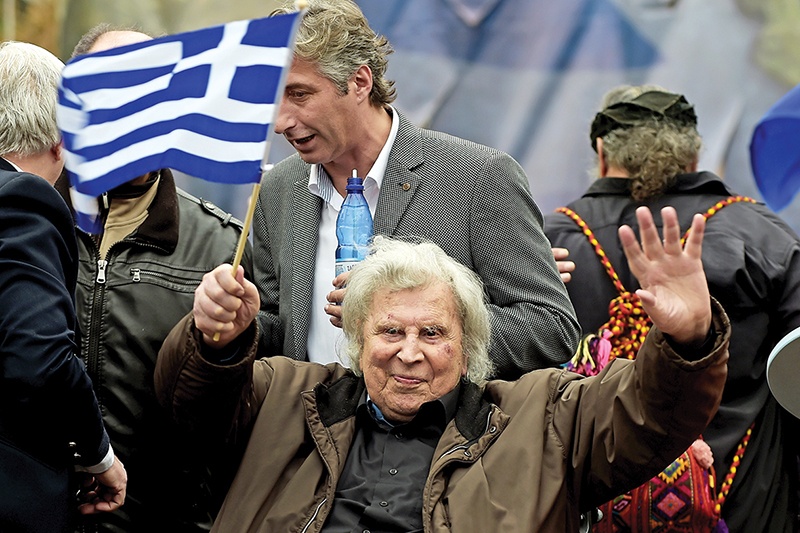 In this file photo Greek composer Mikis Theodorakis gestures during a demonstration to urge the government not to compromise in the festering name row with neighboring Macedonia, at the Syntagma Square in Athens. — AFP photos
In this file photo Greek composer Mikis Theodorakis gestures during a demonstration to urge the government not to compromise in the festering name row with neighboring Macedonia, at the Syntagma Square in Athens. — AFP photosCelebrated composer Mikis Theodorakis, who has died aged 96, wrote the music for the classic film “Zorba the Greek” and was an icon of resistance to Greece’s 1967-1974 military junta. A prolific talent who personified the modern face of Greek music, he was perhaps best-known around the world for his film title scores which also included “Z” in 1969 and “Serpico” in 1973. Back home, he was equally adulated for his resistance to the seven-year rule of the Colonels in a long political career.
His work ranged from operas to choral music and popular songs, providing a soundtrack to the life of his country. “Today we lost a part of Greece’s soul,” said Culture Minister Lina Mendoni. “Mikis Theodorakis, our Mikis, the teacher, the intellectual, the radical passed away.” The country will mark three days of mourning to honor his long career and cultural contribution. Theodorakis made the high art of Nobel prize-winning poets like Odysseas Elytis and George Seferis accessible to everyone through music, his biographer Gail Holst-Warhaft said. “When I first went to Greece, you could go and put some money into a jukebox and you could hear the finest poets of Greece set to his music,” she told NPR, the US radio network, in 2018.
Resistance and torture
Born into a family of Cretan origin on July 29, 1925 on the northern Aegean island of Chios, Theodorakis joined the resistance against the German and Italian occupation of Greece when he was 17, during World War II. Liberation in 1944 was followed almost immediately by civil war between the communists and royalists. By the time he graduated from Athens Conservatory in 1950, Theodorakis had already been sent to deportation camps on several occasions. At one point, he was sent to the dreaded Makronisos island prison off the eastern coast of Attica, where he was tortured as a “red”.
After completing music studies in the Paris Conservatory, Theodorakis was elected to parliament as a leftwing deputy in 1964. That year he also scored the theme of “Zorba the Greek”, to which Anthony Quinn danced the popular “sirtaki” that went on to be known as the “Zorba dance”. In 1969 he wrote the score for “Z”, a film based on the assassination of Greek peace activist Grigoris Lambrakis which won the Oscar for Best Foreign Language Film that year.
 Mikis Theodorakis’ daughter, Margarita (second left) with relatives and friends escort the coffin of the legendary Greek composer outside of his home in Athens, yesterday.
Mikis Theodorakis’ daughter, Margarita (second left) with relatives and friends escort the coffin of the legendary Greek composer outside of his home in Athens, yesterday.Hero’s welcome
When a dictatorship seized control of the government in a 1967 coup, Theodorakis was among the first leftwing politicians to be arrested. Pardoned a year later, he was involved in setting up the clandestine Patriotic Front, which led to another detention and a ban on his works. But with his health sapped by tuberculosis and international pressure mounting, the dictators were forced to release him again in 1970 and he returned to Paris.
“This taste of freedom is still bitter because left in Athens are my wife and my two children and because so many of my comrades are suffering,” Theodorakis said in a statement reported by the New York Times. Four years later the dictatorship imploded and Theodorakis returned home to a hero’s welcome. On July 24, 1974, an immense crowd broke down police barriers to greet him at the airport, many chanting his name.
He was back in parliament in 1981 on a Greek Communist Party (KKE) ticket, joining another icon of democratic resistance-popular actress Melina Mercouri. Theodorakis changed sides in 1990, joining the conservative New Democracy government. He briefly retained the post of minister without portfolio until 1992, when he retired from politics.
Controversial comments
Even in old age, he maintained an active interest in Greece’s politics and its slide into economic crisis, living largely out of the public eye in a home beneath the Acropolis. He made headlines with outspoken comments, likening former US President George W. Bush to Adolf Hitler and asserting that Jews were “little people” at the root of evil. Theodorakis was also an early proponent of rapprochement between Greece and Turkey, which came close to war following the 1974 invasion of Cyprus by Turkish forces.
In 2012 he was tear-gassed by riot police during an anti-austerity demonstration outside parliament after Greece sank into debt and was bailed out by the European Union and the International Monetary Fund. In 2018 he campaigned against an agreement between Athens and Skopje to rename Greece’s northern neighbor North Macedonia, ending a three-decade dispute. He warned that if Greece dropped its objections to North Macedonia joining NATO and the EU, Skopje “(will) threaten us from a stronger position tomorrow”.
He was highly critical of then prime minister Alexis Tsipras, whom he accused of betraying his leftwing roots by agreeing to impose EU-mandated austerity reforms after coming to power in 2015. Along with lifelong wife Myrto, Theodorakis is survived by his daughter Margarita and son George.-AFP











